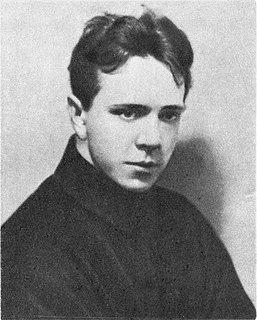A Quote by Radhanath Swami
Things can give pleasure to the mind and senses, but only love can give pleasure to the heart. And ultimately, that is what we are looking for.
Related Quotes
At the heart of our desires is eternal happiness without the slightest hint of misery. You could say that we are pleasure seekers; however, seeking pleasure from the objects of our five senses produces fleeting moments of pleasure whereas, pleasure of one's self, a soul, is eternal and ever-increasing pleasure.
What is it that we in the theatre give? Instead of images on canvas or in the form of statuary or music, we give our body, voice, feelings, will, imagination — we give a form of pulsating art to life itself; we give it to our characters and we give it to our audiences. Nothing, absolutely nothing remains for us save the pleasure of having given pleasure.
When we say that pleasure is the end, we do not mean the pleasure of the profligate or that which depends on physical enjoyment--as some think who do not understand our teachings, disagree with them, or give them an evil interpretation--but by pleasure we mean the state wherein the body is free from pain and the mind from anxiety.
There is no satisfying the senses, not even with a shower of money. "The senses are of slight pleasure and really suffering." When a wise man has realised this, he takes no pleasure, as a disciple of the Buddhas, even in the pleasures of heaven. Instead he takes pleasure in the elimination of craving.
Joy is not the same as pleasure or happiness. A wicked and evil man may have pleasure, while any ordinary mortal is capable of being happy. Pleasure generally comes from things, and always through the senses; happiness comes from humans through fellowship. Joy comes from loving God and neighbor. Pleasure is quick and violent, like a flash of lightning. Joy is steady and abiding, like a fixed star. Pleasure depends on external circumstances, such as money, food, travel, etc. Joy is independent of them, for it comes from a good conscience and love of God.
Marriage has, for its share, usefulness, justice, honour, and constancy; a stale but more durable pleasure. Love is grounded on pleasure alone, and it is indeed more gratifying to the senses, keener and more acute; a pleasure stirred and kept alive by difficulties. There must be a sting and a smart in it. It ceases to be love if it has no shafts and no fire.
We know there are certain chemicals that are designed to give us a rush of pleasure. But, one of the most amazing things about being human is our capacity to override that pleasure. To either say, 'I don't need that pleasure right now. I'm going to ignore the craving.' Or to find something else that we find a deeper sense of reward from.
The only person in all the world who can give you pleasure, or deny it, is yourself. No matter how much we love someone, the decision to experience pleasure, and to make room for it in our lives, is an internal one. If you are resistant, you could be around the most joyous people in the world and be miserable.
It is pleasure that lurks in the practice of every one of your virtues. Man performs actions because they are good for him, and when they are good for other people as well they are thought virtuous: if he finds pleasure in helping others he is benevolent; if he finds pleasure in working for society he is public-spirited; but it is for your private pleasure that you give twopence to a beggar as much as it is for my private pleasure that I drink another whiskey and soda. I, less of a humbug than you, neither applaud myself for my pleasure nor demand your admiration.
When you're comfortable and secure, it's not enough. The mind doesn't stop there because it has to continue to focus itself as this body, so it moves to pleasure. And pleasure really is a non-existent thing. When we're experiencing pleasure, we're trying to hold onto it as it leaves, so it really isn't pleasure. Pleasure is pain because we're grasping.
THE SUFFERING OF GENIUS AND ITS VALUE. The artistic genius desires to give pleasure, but if his mind is on a very high plane he does not easily find anyone to share his pleasure; he offers entertainment but nobody accepts it. That gives him, in certain circumstances, a comically touching pathos; for he has no right to force pleasure on men. He pipes, but none will dance: can that be tragic?






































